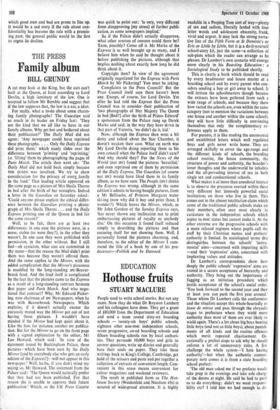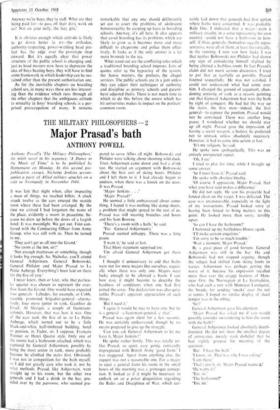Hothouse fruits
EDUCATION STUART MACLURE
People used to write school stories. But not any more. Now they do what Dr Royston Lambert and his colleagues have done. They get a grant of £80,000 from the Department of Education and send a team round sixty-six boarding schools — twenty-six boys' public schools, eighteen other non-xmc independent schools, seven progressive,. co-ed boarding schools and fifteen boarding schools run by local authori- ties. They persuade 10,000 boys and girls to answer questions, write up diaries and generally bare their souls on • paper. They take these writings back to King's College, Cambridge, get hold of the scissors and paste and put together a collection of extracts of convenient length. Con- venient in this sense means convenient for colour magazines and weekend reviewers.
The result in published form as The Hot- house Society (Weidenfeld and Nicolson 45s) is assured of widespread attention. It is highly readable in a Peeping Tom sort of way—plenty of sex and sadism, liberally larded with four letter words and adolescent obscenity, frank, vivid and urgent. It may lack the strong narra- tive line of the Fifth Form at St Dominic's or Eric or Little by Little, but it is a do-it-yourself school-story kit, just the same—a collection of sub-plots which the reader can arrange as he pleases. Dr Lambert's own scenario will emerge more clearly in his Boarding Education : a Sociological Study to be published shortly.
This is clearly a book which should be read by every headmaster and house master at a boarding school and by every parent who con- siders sending a boy or girl away to school. It will irritate the schoolmasters though because the extracts have been gathered from such a wide range of schools, and because they show how varied the schools are, even within the same category (not to mention the variations between one house and another within the same school), they will have little difficulty in convincing themselves that only the complimentary re- ferences apply to them.
For parents, it is like reading the uncensored and uninhibited letters which well regulated boys and girls never write home. They are arranged skilfully to cover the age-range and the different kinds of schools, the boarding school routine, the house community, the structure of power and authority, the boarder's inner thoughts and the underworld he inhabits and the all-pervading interest of sex in both single sex and coeducational schools.
What makes it of more than anecdotal interest is to observe the pressures exerted within these very different but intensely powerful social institutions on those who live in them. This comes out in the almost totalitarian claim which some of the traditional public schools make on their members, often seen most clearly in caricature in the independent schools which aspire to suac status but cannot make it. At the other extreme are the progressive schools with a more relaxed regimen where pupils call the staff by their Christian names and prefects' authority is limited. In sociological terms this distinguishes between the schools' instru- mental' aims—concerned with imparting skills —and • their 'expressive' aims, concerned with implanting values and attitudes.
Dr Lambert's correspondents show how deeply the public schools' expressive' aims are rooted in a secure acceptance of hierarchy and authority. They bring out the importance of fagging as an initiation procedure which instils acceptance of the school's social order. 'You look forward to the second year and then at least you can push the first year around.' Those whom Dr Lambert calls the conformists and the ritualists accept this whole-heartedly or faute de mieux and pass through the chrysalis stages to prefecture where they wield more authority than most of them are ever likely to wield again. There's a lot about big boys beating little boys (and not so little boys), about punish- ments of all kinds and the routine offences which merit repeated chastisement. Oc- casionally a prefect stops to ask why he should enforce a lot of unnecessary rules. A few challenge the whole system—'I hate having authority'—but when the authentic contem- porary note comes it is from a state boarding school prefect : 'The old man asked me if we prefects would take prep in the evenings and take sole charge of the dorms at night. He said he had to push us to do everything: didn't we want responsi- bility etc? I told him we had enough to do.
Anyway we're boys, they're staff. What are they being paid for—to pass off their dirty work on us? Not on your nelly. the lazy gits.'
It is obvious enough which attitude is likely to go down better in ici—the orthodox, authority-respecting, power-wielding head pre- fect has the edge over the prototype shop steward. But it's equally clear that power structure of the public school is changing and, just as head masters now have to deprecate the idea of boys beating boys, they will have to find some framework in which leadership can be sus- tained other than the present authoritarian one.
As for the inevitable chapters on boarding school sex, in many ways these are less interest- ing than the evidence which runs through all the other chapters that the ambiguous attitude to sexuality in boys' boarding schools is a per- petual preoccupation of many. It remains
remarkable that any one should deliberately set out to court the problems of adolescent homosexuality by cooping up boys in boarding schools. Anyway, it's all here. It also appears that co-ed boarding has its problems which are likely to grow as it becomes more and more difficult to chaperone and police them effec- tively. It looks as if the only answer is a lot more bromide in the tea.
What stand out are the conflicting roles which a traditional boarding school imposes. Lots of quotes refer to the hypocrisy of the system. the house masters, the prefects, the chapel services. The public schools are in a jam unless they can adjust their techniques of authority and discipline as primary schools and parents have adjusted theirs. There is not much time in which to-do this before the unrest which has hit universities makes its impact on the prefects' common room.







































 Previous page
Previous page